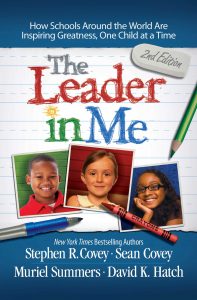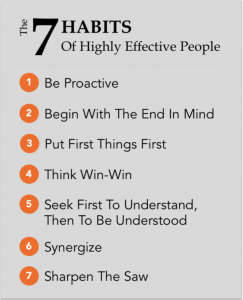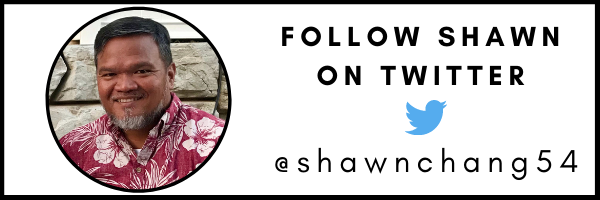TL;DR:
- Character development is necessary.
- The 7 habits of highly effective people include being proactive, beginning with the end in mind, putting first things first, thinking win-win, seeking first to understand then be understood, synergizing, and sharpening the saw.
Character development should be a major part of all schools.
As a district special education resource teacher for the past 14 years, I have helped new special education teachers and a handful of veteran teachers meet the needs of their struggling students. And over the years, I have watched as students who have Individualized Educational Programs (IEPs) struggle through school all the way to being exited with no functional skills on connecting or navigating the world.
I have encountered parents, frustrated and exhausted in trying to do the best for their child, only to end up with an adult-aged child, unable to independently fend for themselves, needing constant adult support in all or most aspects of their adult life. Somehow, we are still failing some children.
Through the last 14 years, I have been involved with school teams, assisting the service providers in supporting students from IDEA eligibility categories such as Specific Learning Disability (SLD), Emotional Impairment (EI), Autism Spectrum Disorder (ASD) and Intellectually Impaired (IE) just to name a few out of 14 categories in all.
Over that span, I’ve always wondered why even with a heavy-laden IEP, full of intensive supports could not produce a student capable of independently navigating the environment around him/her without adult support.
This question hunted me until COVID happened. Because of COVID and the situation where schools were all online, I was able to sit and really contemplate and reflect on current and past practices in the school system where I work. This time of reflection is important for anyone looking to improve on any focus. So it was a breath of fresh air.
Along with the reflecting I did a lot of clarifying of my question which led me to search for answers.
And I believe I have found the answer. I’ve come to realize that some teachers, especially those I have mentored, because of the pressure to get students to perform standards, get so focused on strategies to increase test scores and miss the opportunity to instead teach functional skills vital for students to be successful in navigating life after school.
We need to reinstitute character development in our schools and make that a vital part of the school mission. Share on XDue to the “No Child Left Behind Act” of 2001, states were required to develop assessments on basic skills. Turning in these assessments for all students to the federal government is how states got their funding for schools. Doing this removed all character development curriculum from schools making performance based on academic standards the goal.
Students’ performance, or “output,” was targeted heavily. The quality of instruction and instructional approaches, or “input,” was neglected. This neglect created students ill-equipped to connect successfully with society. Being tremendously dependent on the adult and government for support.
Character development is necessary.
Character development was an important part of my upbringing. Some students were not as fortunate. My childhood was dysfunctional. I grew up with a single parent. My grandparents raised me. It’s by them that biblical principles are instilled in me. I continue to live by them today.
Students who come from dysfunctional homes have a great disadvantage. If they don’t have the opportunity to develop their character in the home, they will learn from somewhere else. Most of the time, it’s from all the information and happenings that are going on in social media. This is a bad thing, and we can see the result of that around us today.
So realizing this made me search into my own upbringing. What were the things in my past, that allowed me to become the person I am today? What were the things that were taught to me that allowed me to grow to who I am today? And more specifically, “What is education and its purpose?”
Let’s take a look at some thoughts of what education is supposed to be.
https://files.ascd.org/staticfiles/ascd/pdf/journals/ed_update/eu201207_infographic.pdf
“The purpose of education has always been to every one, in essence, the same—to give the young the things they need in order to develop in an orderly, sequential way into members of society.”
– John Dewey, “Individual Psychology and Education” The Philosopher, 12, 1934
 “The function of education is to teach one to think intensively and to think critically. But education which stops with efficiency may prove the greatest menace to society. The most dangerous criminal may be the man gifted with reason but no morals…We must remember that intelligence is not enough. Intelligence plus character— that is the goal of true education.”
“The function of education is to teach one to think intensively and to think critically. But education which stops with efficiency may prove the greatest menace to society. The most dangerous criminal may be the man gifted with reason but no morals…We must remember that intelligence is not enough. Intelligence plus character— that is the goal of true education.”
– Martin Luther King Jr., speech at Morehouse College, 1948
“The main purpose of the American school is to provide for the fullest possible development of each learner for living morally, creatively, and productively in a democratic society.”
– The ASCD Committee on Platform of Beliefs, Educational Leadership, January 1957
“[The purpose of education] has changed from that of producing a literate society to that of producing a learning society.”
– Margaret Ammons, Associate Secretary of ASCD, “Purpose and program: How does commitment today differ from that in other periods,” Educational Leadership, October 1964
[scroll down to keep reading]Character building is and shall always be vital to a child’s education.

We need to reinstitute character development in our schools and make that a vital part of the school mission. This is important because some children are not fortunate to get character building in homes if both parents are working and the students are home alone raising themselves.
There is one program that I was introduced to just a few years ago. It was created by a man named Stephen Covey. He wrote a well-known self-help book titled “The 7 habits of highly effective people.” He also wrote a book for schools titled, “The Leader in Me.”
Click here to learn more about the book.
This book teaches the following 7 habits:

These 7 principles, I have come to realize, have been taught to me by my grandfather when I was a youngster. The past 3 years, I have seen the difference this program can do to the learning of the children in a school that utilizes the “leader in me” program. If this can work for some schools, it can work for you and may be worth looking into if you’re looking for a character-building program.
Let me know your thoughts. Find me on Twitter and other social media websites. I look forward to networking with you.
About Shawn K. Chang
Shawn K. Chang is an American special Education Resource Educator, soon-to-be author, coach, speaker, and philanthropist. Shawn is known for his 23 years of teaching in the public school system in the states of Hawaii, 14 years of which specifically provides support, training, and consultative coach to teachers and administrators with everything surrounding special education and special education law.
His passion is to help those who can’t help themselves and help the students of the education system to connect with the world. Shawn has a passion for reshaping the education system and redefining and refocusing trainings to individuals from professional development to personal development. Be prepared for what’s to come from Shawn K. Chang.





